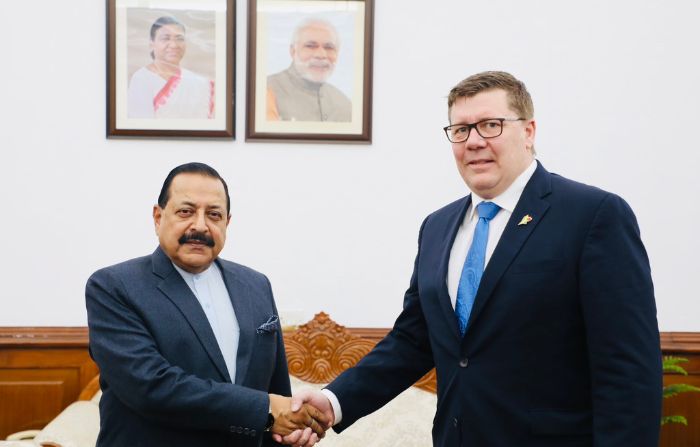- Sunday, April 20, 2025

By: Shubham Ghosh
HERE are news in brief on Indian economy and business for Wednesday, February 21, 2024:
India and Canada on Wednesday discussed collaboration as well as joint ventures in areas such as electric vehicles, cyber physical systems, quantum technologies, green hydrogen fuel and deep ocean mining. A high-level Canadian delegation led by Scott Moe, premier of the country’s Saskatchewan province, held discussions with India’s science & technology minister Jitendra Singh on partnerships in areas such as clean technologies, bioeconomy, bio-based materials for different applications, food & agriculture technologies, affordable healthcare including pharmaceuticals and biomedical instrumentation. Welcoming the Canadian delegation, Singh said 23 lakh (2.3 million) Indian diaspora were reinforcing Indo-Canadian relations and contributing to the development of both nations.
Indian finance minister Nirmala Sitharaman on Wednesday asked the World Bank to explore a collaborative and holistic approach in water management with a special focus on restoration of water bodies. During her meeting with World Bank managing director (operations) Anna Bjerde, and MD and CFO Anshula Kant in New Delhi, Sitharaman discussed matters related to the multilateral funding agency’s engagement with India and other issues. Sitharaman also said the World Bank should lead in taking forward evolution exercises and recommendations of the G20 IEG (independent expert group) done under India’s G20 presidency on strengthening Multilateral Development Banks as they look up to the lender for such reform initiatives.
Over one-third of India’s export of oil products to the Group of Seven (G7)-led coalition countries was derived from Russian crude, a European think-tank said, highlighting how the partners shunned buying Russian crude and imposed price caps but a loose policy on refined product allowed third countries to use Russian oil and legally export products to them. While there are no restriction or sanctions on buying/using Russian crude oil and exporting fuels such as diesel derived from it, the G7 rich nations, the European Union and Australia – called the price cap coalition countries – first set a crude price cap of $60 (£47.5) per barrel starting December 5, 2022, and later on products like diesel to keep market supplied while limiting Moscow’s revenue.
India’s Narendra Modi government on Wednesday eased foreign direct investment (FDI) norms in the space sector by allowing 100 per cent overseas investment in making components for satellites, as part of efforts to attract overseas players and private companies into the segment. The decision was taken at a Cabinet meeting chaired by prime minister Narendra Modi. The satellite sub-sector has now been divided into three different activities with defined limits for foreign investment in each such sector, according to an official statement. By changing the current policy, the government has allowed up to 74 per cent FDI under automatic route in satellites-manufacturing and operation, satellite data products, and ground and user segments.
Lakhanlal Dewangan, commerce and industry and labour minister of the central Indian state of Chhattisgarh, on Wednesday said in the state assembly that a new industrial policy for 2024-29 will be framed and an investors’ meet will be organised to attract more ventures and projects in the state. Replying to discussion on demands for grants worth Rs 773.28 crore (£73.8 million) from his departments, the minister said ‘Chhattisgarh Udyam Kranti Yojana’ will be started to provide self-employment opportunities to youths. After the discussion, demands for grants, that included Rs 530.29 crore (£50.6 million) for the commerce and industry department and Rs 242.98 crore (£23.2 million) for the labour department, were passed in the House. In December, prime minister Narendra Modi’s Bharatiya Janata Party returned to power in Chhattisgarh defeating the Indian National Congress.
(With agencies)